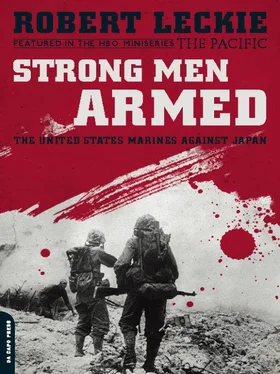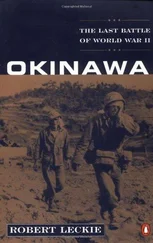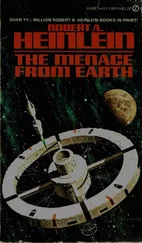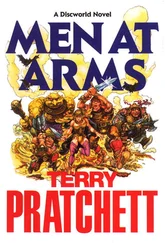Robert Leckie - Strong Men Armed
Здесь есть возможность читать онлайн «Robert Leckie - Strong Men Armed» весь текст электронной книги совершенно бесплатно (целиком полную версию без сокращений). В некоторых случаях можно слушать аудио, скачать через торрент в формате fb2 и присутствует краткое содержание. Город: Cambridge, Год выпуска: 2010, ISBN: 2010, Издательство: Da Capo Press, Жанр: nonf_military, на английском языке. Описание произведения, (предисловие) а так же отзывы посетителей доступны на портале библиотеки ЛибКат.
- Название:Strong Men Armed
- Автор:
- Издательство:Da Capo Press
- Жанр:
- Год:2010
- Город:Cambridge
- ISBN:978-0-786-74832-7
- Рейтинг книги:3 / 5. Голосов: 1
-
Избранное:Добавить в избранное
- Отзывы:
-
Ваша оценка:
- 60
- 1
- 2
- 3
- 4
- 5
Strong Men Armed: краткое содержание, описание и аннотация
Предлагаем к чтению аннотацию, описание, краткое содержание или предисловие (зависит от того, что написал сам автор книги «Strong Men Armed»). Если вы не нашли необходимую информацию о книге — напишите в комментариях, мы постараемся отыскать её.
Strong Men Armed — читать онлайн бесплатно полную книгу (весь текст) целиком
Ниже представлен текст книги, разбитый по страницам. Система сохранения места последней прочитанной страницы, позволяет с удобством читать онлайн бесплатно книгу «Strong Men Armed», без необходимости каждый раз заново искать на чём Вы остановились. Поставьте закладку, и сможете в любой момент перейти на страницу, на которой закончили чтение.
Интервал:
Закладка:
They were dug in on Tulagi, with most of their defenses concentrated at the foot of the boot, the southeastern tip. They were in hillside caves, squeezed into the fissures pocking the island’s generous outcropping of rock. Against them came that splendid First Raider Battalion commanded by Lieutenant Colonel Merritt Edson, a short tough man of hard jaw and soft voice, of smiling lips and large cold unsmiling eyes. Red Mike, the men called him, for his thinning wisps of carroty hair.
Tulagi’s southeastern beaches were dense with smoke and a small Jap boat blazed against the shore when Red Mike’s Raiders leaped from their boats into the surf and charged across a narrow beach into the murk of the jungle. Enemy bullets whispered among them, but no men fell. The Raiders drove swiftly across the island at a point two-thirds up the boot. Behind them came the Second Battalion, Fifth Marines, who turned left and quickly overran the lightly defended northwestern third of the island.
The Raiders wheeled right to drive down the island’s spine to the lowlands, working through rocks and trees, keeping clear of shore trails covered by enemy cliffs. They attacked four companies abreast. They began to take a withering sniper fire —snipers under houses, tied into the tops of trees, dug in beneath those forest giants with huge buttressing roots four and five feet high. Sniper fire came from the rear too, for the Japanese soldier was already using his trick of lying doggo until the enemy had passed and he might shoot into his rear. Now the Raiders on the southern shore of the island were pinned down by fire from a concentration of machine guns atop a hill. Mortars crunched among them. Caves spat fire. There were casualties, among them a company commander. It took an hour to get that hill, it took rifles and grenades of the men who inched forward under covering fire until they had reached the point when they might come erect and charge the cavemouths. Then Edson’s men moved down to the cricket field set between two hills, east and west. Here the Japanese fought skillfully from caves and crevices. Here they could not be budged and the Marines dug in, for it was now twilight and obvious that the island could not be taken that day.
That night came the first banzai charge.
Marines lying in hastily scooped-out foxholes could hear the enemy assembling. The Japanese crawled noisily out of their caves and holes. They came running in scattered bands, their officers leaping before them and waving long samurai sabers. They howled in their native tongue or shrieked those quaint English oaths, which, they had been told, would melt the hearts of the Americans.
“Japanese boy drink American boy’s blood!”
“Death for the Emperor!”
The Japanese fired their rifles as they charged, deliberately trying to draw giveaway fire, but they were met by grenades spiraling silently through the black to flash among them with flesh-rending crashes. In twos and threes, they tried to infiltrate in the dark, to close with knives—and where they did they were met with knives. They punched a hole between two companies on the southern flank, but were beaten down in individual combat. They swirled savagely around Marine positions in the center, coming five times against a rise in ground. Mortar shells thumped and crashed among them throughout the night, breaking them up as they assembled, driving them into Raider guns. In the end, they failed. In the morning, the Marine counterattack swept forward and squeezed the Japs to death among the limestone hills of the southern third of the island.
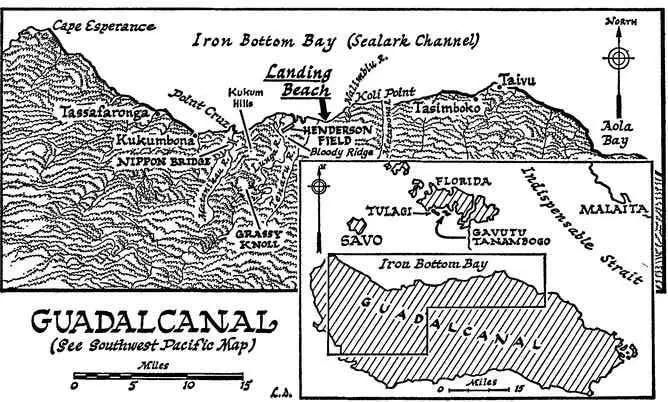
Tulagi was taken by nightfall of August 8.
There had been no difficulty in securing Tulagi’s western offshore flank represented by Haleta Village on the southwestern tip of big Florida Island. Company B of the First Battalion, Second Marines, had landed without opposition at twenty minutes before eight o’clock on D-Day morning. Private Russell Miller was the first of these Marines to touch land, becoming the first American to tread Japanese-held soil in World War Two. And Florida fell without a shot fired.
The eastern offshore flank represented by Guvutu-Tanambogo was not so cheaply won. It was not possible to land at more than one or two points on either of these Siamese-twin islets, for both rose steeply from the sea and were ringed with coral. The only landing place on Guvutu, the southernmost or lowest of these two isles connected on a north-south axis, was the seaplane ramp and pier on the northeastern tip. Invaders had to sail around the little islet to get in at it.
At noon of August 7, after Guvutu had been pounded from the sea and sky, Higgins boats carrying the First Parachute Battalion under Major Robert Williams roared straight for the seaplane ramp.
They were struck hard by enemy fire.
The Marines could not land at the ramp, because naval gunfire had turned it into a jumble of concrete. The boats slanted toward the dock. Out leaped the men, some of them to scamper ashore. But most were pinned down in the lee of the pier. They were like men lined up against a cellophane wall, shot at from both sides. Fire came from trenches behind the pier, from a Guvutu hill to their left and from across the causeway on Tanambogo to their right. One boat ground ashore to the left, bringing a section of mortars to the rescue. Soon the mortar shells were leaving the stovepipes with a metallic plop, landing with a crrrunch-whummp in the enemy trenches. The assault swept forward again, group after group gaining the pier and charging forward to ram headlong against the steep, cave-pocked defenses of Guvutu.
Then Major Williams was hit and the command passed to Major Charles Miller. Captain Harry Torgerson began lashing sticks of dynamite to the ends of poles, or of strips of planking. Under the protective fire of his men, Torgerson rushed the cavemouths, hurling his explosives like javelins, sometimes stooping to poke them in if the opening was too narrow. Sometimes a bare instant separated his throw and the blast, for these were only five-second fuses. There came a time when an instantaneous explosion sent him rolling down a hill.
“Goddam, Cap’n,” yelled an irreverent Marine, “you done lost the seat of yer pants!”
“Screw the pants!” screamed the singed and denuded Torgerson. “Get me more dynamite!”
Thus was born the first of the gloriously raggedy-assed Marines, and thus was Guvutu conquered.
If the Japanese bombers flew to Guadalcanal from the big northern air base at Kavieng on New Ireland, their route would take them over Buka Passage in the Northern Solomons—and there they could be spotted by the Australian coastwatcher, Jack Read.
If they flew from the bigger base at Rabaul, their route took them over Buin—and there they could be seen by the Australian coastwatcher, Paul Mason.
On the morning of August 7 the red-balled bombers rose from Rabaul and went roaring south. They passed over Buin at about half-past ten, the thundering of their motors rousing Mason as he sat in his palm-thatched hideout on Malabite Hill. Mason rushed outside. He counted 24 torpedo bombers, “Kates” as they were called. He ran back inside and flashed his radio message:
“Twenty-four bombers headed yours.”
Twenty-five minutes later, aboard the Australian cruiser Canberra in the waters between Guadalcanal and Tulagi, an impersonal voice came over the bullhorn:
“The ship will be attacked at noon by twenty-four torpedo bombers. All hands will pipe to dinner at eleven o’clock.”
Americans within earshot of that announcement could grin at the suggestion that the Japanese bombers were after “the ship,” which was Australian, rather than the convoy, which was otherwise entirely American. But, as the Aussies say, the information was “fair dinkum,” and at exactly twelve noon 24 bombers did appear over Sealark Channel. They were met by a roar of antiaircraft fire which put them to flight with only three of their eggs splashing harmlessly into the sea.
Читать дальшеИнтервал:
Закладка:
Похожие книги на «Strong Men Armed»
Представляем Вашему вниманию похожие книги на «Strong Men Armed» списком для выбора. Мы отобрали схожую по названию и смыслу литературу в надежде предоставить читателям больше вариантов отыскать новые, интересные, ещё непрочитанные произведения.
Обсуждение, отзывы о книге «Strong Men Armed» и просто собственные мнения читателей. Оставьте ваши комментарии, напишите, что Вы думаете о произведении, его смысле или главных героях. Укажите что конкретно понравилось, а что нет, и почему Вы так считаете.
